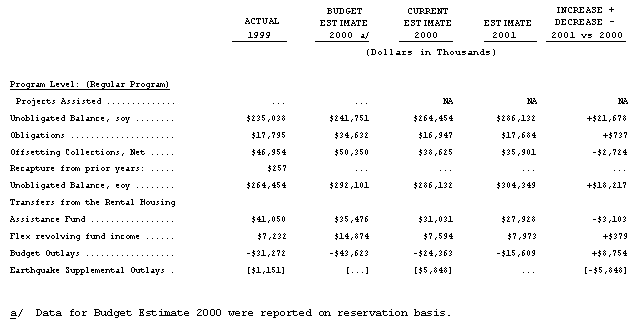HUD's 2001 Budget
Congressional Justifications for Estimates
DEPARTMENT OF HOUSING AND URBAN DEVELOPMENT
FLEXIBLE SUBSIDY FUND
PROGRAM HIGHLIGHTS

SUMMARY OF BUDGET ESTIMATES
- SUMMARY OF BUDGET REQUEST
No further appropriations of budget authority are proposed for the Flexible Subsidy Fund. The Budget assumes that the Flexible Subsidy Fund will continue to serve as a repository for excess rental charges appropriated from the Rental Housing Assistance Fund. This transfer will continue to offset the spendout of Flexible Subsidy obligation but will no longer be used for new Flexible Subsidy obligations and reservations. In fiscal years 1996 and thereafter, collections in the Flexible Subsidy Fund have not been made available in Appropriations acts for use. Only carryover from fiscal year 1995 remains available for new reservations. These reservations will be devoted to structure and health and safety needs in projects that received Section 202 loans and capital advances.
- CHANGES FROM 1999 ESTIMATES INCLUDED IN 2000 BUDGET
The 1999 estimates in the 2000 budget were accounted for on the reservation basis; however, actual data for 1999 have been revised to reflect the change to the obligation basis.
- CHANGES FROM ORIGINAL 2000 BUDGET ESTIMATES
Flexible Subsidy is provided in the form of direct loans for operating assistance and capital improvements. Current 2000 estimates have been revised to reflect both the technical adjustments since the 2000 Budget and an obligation basis reporting, rather than the reservation basis reporting used previously.
PROGRAM DESCRIPTION
The Flexible Subsidy Fund was initially authorized by the Housing and Community Development Amendments of 1978, subsequently amended by the Housing and Community Development (HCD) Act of 1987, and further amended by the McKinney Homeless Assistance Amendments Act of 1988. The HCD Amendments of 1978 established the Flexible Subsidy Fund into which repaid funds would be credited along with any transfer from the Rental Housing Assistance Fund.
The projects eligible for Flexible Subsidy assistance originally included those assisted under the Section 236 interest reduction program, the Section 221(d)(3) below market interest rate program, and the Section 101 rent supplement program. Eligibility was expanded in 1983 to include projects converted from Section 236 or Section 101 to assistance under Section 8 of the 1937 Housing Act; and in 1987 to include certain projects which had received Section 202 loans for elderly or handicapped housing, and projects assisted under Section 23 of the 1937 Act (as in effect prior to 1975).
Projects under Sections 236, 221(d)(3), 101, and 202 which are acquired and subsequently sold by HUD with mortgage insurance and affordability restrictions also were eligible for Flexible Subsidy assistance.
The original objectives of the Flexible Subsidy program were to: (1) reduce claims on the Department's mortgage insurance funds by aiding projects in financial distress where existing sources of financial relief are inadequate to cure the projects' problems, and (2) preserve and protect the existing supply of low- and moderate-income housing by upgrading the quality of management services and effecting short-term improvements which will enable projects to become self-sustaining and remain affordable.
The enactment of the Multifamily Assisted Housing Reform and Affordability Act of 1997 expands the tools available to address the needs of insured and HUD-held multifamily projects. The use of alternative funding for FHA-insured projects has eliminated the need for the Flexible Subsidy.
Content Archived: January 20, 2009
|